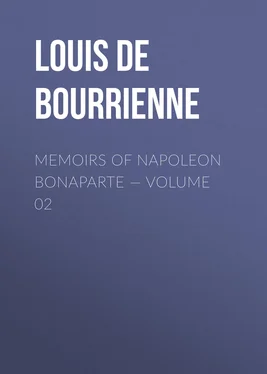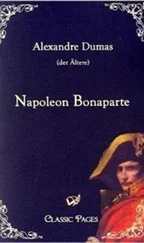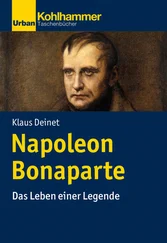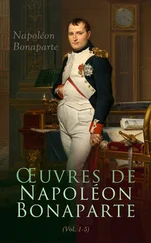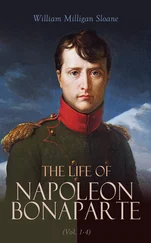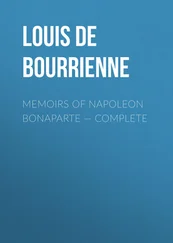Louis Bourrienne - Memoirs of Napoleon Bonaparte — Volume 02
Здесь есть возможность читать онлайн «Louis Bourrienne - Memoirs of Napoleon Bonaparte — Volume 02» — ознакомительный отрывок электронной книги совершенно бесплатно, а после прочтения отрывка купить полную версию. В некоторых случаях можно слушать аудио, скачать через торрент в формате fb2 и присутствует краткое содержание. Жанр: Биографии и Мемуары, История, foreign_edu, foreign_antique, foreign_prose, на английском языке. Описание произведения, (предисловие) а так же отзывы посетителей доступны на портале библиотеки ЛибКат.
- Название:Memoirs of Napoleon Bonaparte — Volume 02
- Автор:
- Жанр:
- Год:неизвестен
- ISBN:нет данных
- Рейтинг книги:3 / 5. Голосов: 1
-
Избранное:Добавить в избранное
- Отзывы:
-
Ваша оценка:
- 60
- 1
- 2
- 3
- 4
- 5
Memoirs of Napoleon Bonaparte — Volume 02: краткое содержание, описание и аннотация
Предлагаем к чтению аннотацию, описание, краткое содержание или предисловие (зависит от того, что написал сам автор книги «Memoirs of Napoleon Bonaparte — Volume 02»). Если вы не нашли необходимую информацию о книге — напишите в комментариях, мы постараемся отыскать её.
Memoirs of Napoleon Bonaparte — Volume 02 — читать онлайн ознакомительный отрывок
Ниже представлен текст книги, разбитый по страницам. Система сохранения места последней прочитанной страницы, позволяет с удобством читать онлайн бесплатно книгу «Memoirs of Napoleon Bonaparte — Volume 02», без необходимости каждый раз заново искать на чём Вы остановились. Поставьте закладку, и сможете в любой момент перейти на страницу, на которой закончили чтение.
Интервал:
Закладка:
Berthier neither merited the one nor the other. Bonaparte was a man of habit; he was much attached to all the people about him, and did not like new faces. Berthier loved him. He carried out his orders well, and that enabled him to pass off with his small portion of talent.
It was about this time that young Beauharnais came to Milan. He was seventeen years old. He had lived in Paris with his mother since the departure of Bonaparte. On his arrival he immediately entered the service as 'aide de camp' to the General-in-Chief, who felt for him an affection which was justified by his good qualities.
Comte Delaunay d'Entraigues, well known in the French Revolution, held a diplomatic post at Venice when that city was threatened by the French. Aware of his being considered the agent of all the machinations then existing against France, and especially against the army of Italy, he endeavoured to escape; but the city being, surrounded, he was seized, together with all his papers. The apparently frank manners of the Count pleased Bonaparte, who treated him with indulgence. His papers were restored, with the exception of three relating to political subjects. He afterwards fled to Switzerland, and ungratefully represented himself as having been oppressed by Bonaparte. His false statements have induced many writers to make of him an heroic victim. He was assassinated by his own servant in 1802.
I kept a copy of one of his most interesting papers. It has been much spoken of, and Fauche-Borel has, I believe, denied its authenticity and the truth of its contents. The manner in which it fell into the hands of the General-in-Chief, the importance attached to it by d'Entraigues, the differences I have observed between the manuscript I copied and versions which I have since read, and the knowledge of its, authenticity, having myself transcribed it from the handwriting of the Count, who in my presence vouched for the truth of the facts it details—all these circumstances induce me to insert it here, and compel me to doubt that it was, as Fauche-Borel asserted, a fabrication.
This manuscript is entitled, 'My Conversation with Comte de Montgaillard, on the 4th of December 1796, from Six in the Afternoon till midnight, in the presence of the Abbe Dumontel.'
[On my copy are written the words, "Extracts from this conversation, made by me, from the original." I omitted what I thought unimportant, and transcribed only the most interesting passages. Montgaillard spoke of his escape, of his flight to England, of his return to France, of his second departure, and finally of his arrival at Bale in August 1795.]
The Prince de Conde soon afterwards, he said, called me to Mulheim, and knowing the connections I had had in France, proposed that I should sound General Pichegru, whose headquarters were at Altkirch, where he then was, surrounded by four representatives of the Convention.
I immediately went to Neufchatel, taking with me four or five hundred Louis. I cast my eyes on Fauche-Borel, the King's printer at Neufchatel, and also yours and mine, as the instrument by which to make the first overture, and I selected as his colleague M. Courant, a native of Neufchatel. I persuaded them to undertake the business: I supplied them with instructions and passports. They were foreigners: so I furnished them with all the necessary documents to enable them to travel in France as foreign merchants and purchasers of national property. I went to Bale to wait for news from them.
On the 13th of August Fauche and Courant set out for the headquarters at Altkirch. They remained there eight days without finding an opportunity to speak to Pichegru, who was surrounded by representatives and generals. Pichegru observed them, and seeing them continually wheresoever he went, he conjectured that they had something to say to him, and he called out in a loud voice, while passing them, "I am going to Huningen." Fauche contrived to throw himself in his way at the end of a corridor. Pichegru observed him, and fixed his eyes upon him, and although it rained in torrents, he said aloud, "I am going to dine at the chateau of Madame Salomon." This chateau was three leagues from Huningen, and Madame Salomon was Pichegru's mistress.
Fauche set off directly to the chateau, and begged to speak with General Pichegru. He told the general that, being in the possession of some of J. J. Rousseau's manuscripts, he wished to publish them and dedicate them to him. "Very good," said Pichegru; "but I should like to read them first; for Rousseau professed principles of liberty in which I do not concur, and with which I should not like to have my name connected."—"But," said Fauche, "I have something else to speak to you about."—"What is it, and on whose behalf?"— "On behalf of the Prince de Conde."—"Be silent, then, and follow me."
He conducted Fauche alone into a retired cabinet, and said to him, "Explain yourself; what does Monseigneur le Prince de Conde wish to communicate to me?" Fauche was embarrassed, and stammered out something unintelligible. "Compose yourself," said Pichegru; "my sentiments are the same as the Prince de Conde's. What does he desire of me?" Fauche, encouraged by these words, replied, "The Prince wishes to join you. He counts on you, and wishes to connect himself with you."
"These are vague and unmeaning words," observed Pichegru. "All this amounts to nothing. Go back, and ask for written instructions, and return in three days to my headquarters at Altkirch. You will find me alone precisely at six o'clock in the evening."
Fauche immediately departed, arrived at Bale, and informed me of all that had passed. I spent the night in writing a letter to General Pichegru. (The Prince de Conde, who was invested with all the powers of Louis XVIII, except that of granting the 'cordon-bleu', had, by a note in his own handwriting, deputed to me all his powers, to enable me to maintain a negotiation with General Pichegru).
I therefore wrote to the general, stating, in the outset, everything that was calculated to awaken in him that noble sentiment of pride which is the instinct of great minds; and after pointing out to him the vast good it was in his power to effect, I spoke of the gratitude of the King, and the benefit he would confer on his country by restoring royalty. I told him that his Majesty would make him a marshal of France, and governor of Alsace, as no one could better govern the province than he who had so valiantly defended it. I added that he would have the 'cordon-rouge', the Chateau de Chambord, with its park, and twelve pieces of cannon taken from the Austrians, a million of ready money, 200,000 livres per annum, and an hotel in Paris; that the town of Arbors, Pichegru's native place, should bear his name, and be exempt from all taxation for twenty-five years; that a pension of 200,000 livres would be granted to him, with half reversion to his wife, and 50,000 livres to his heirs for ever, until the extinction of his family. Such were the offers, made in the name of the King, to General Pichegru. (Then followed the boons to be granted to the officers and soldiers, an amnesty to the people, etc). I added that the Prince de Conde desired that he would proclaim the King in the camps, surrender the city of Huningen to him, and join him for the purpose of marching on Paris.
Pichegru, having read my letter with great attention, said to Fauche, "This is all very well; but who is this M. de Montgaillard who talks of being thus authorised? I neither know him nor his signature. Is he the author?"—"Yes," replied Fauche. "But," said Pichegru, "I must, before making any negotiation on my part, be assured that the Prince de Conde, with whose handwriting I am well acquainted, approves of all that has been written in his name by M. de Montgaillard. Return directly to M. de Montgaillard, and tell him to communicate my answer to the Prince."
Читать дальшеИнтервал:
Закладка:
Похожие книги на «Memoirs of Napoleon Bonaparte — Volume 02»
Представляем Вашему вниманию похожие книги на «Memoirs of Napoleon Bonaparte — Volume 02» списком для выбора. Мы отобрали схожую по названию и смыслу литературу в надежде предоставить читателям больше вариантов отыскать новые, интересные, ещё непрочитанные произведения.
Обсуждение, отзывы о книге «Memoirs of Napoleon Bonaparte — Volume 02» и просто собственные мнения читателей. Оставьте ваши комментарии, напишите, что Вы думаете о произведении, его смысле или главных героях. Укажите что конкретно понравилось, а что нет, и почему Вы так считаете.
